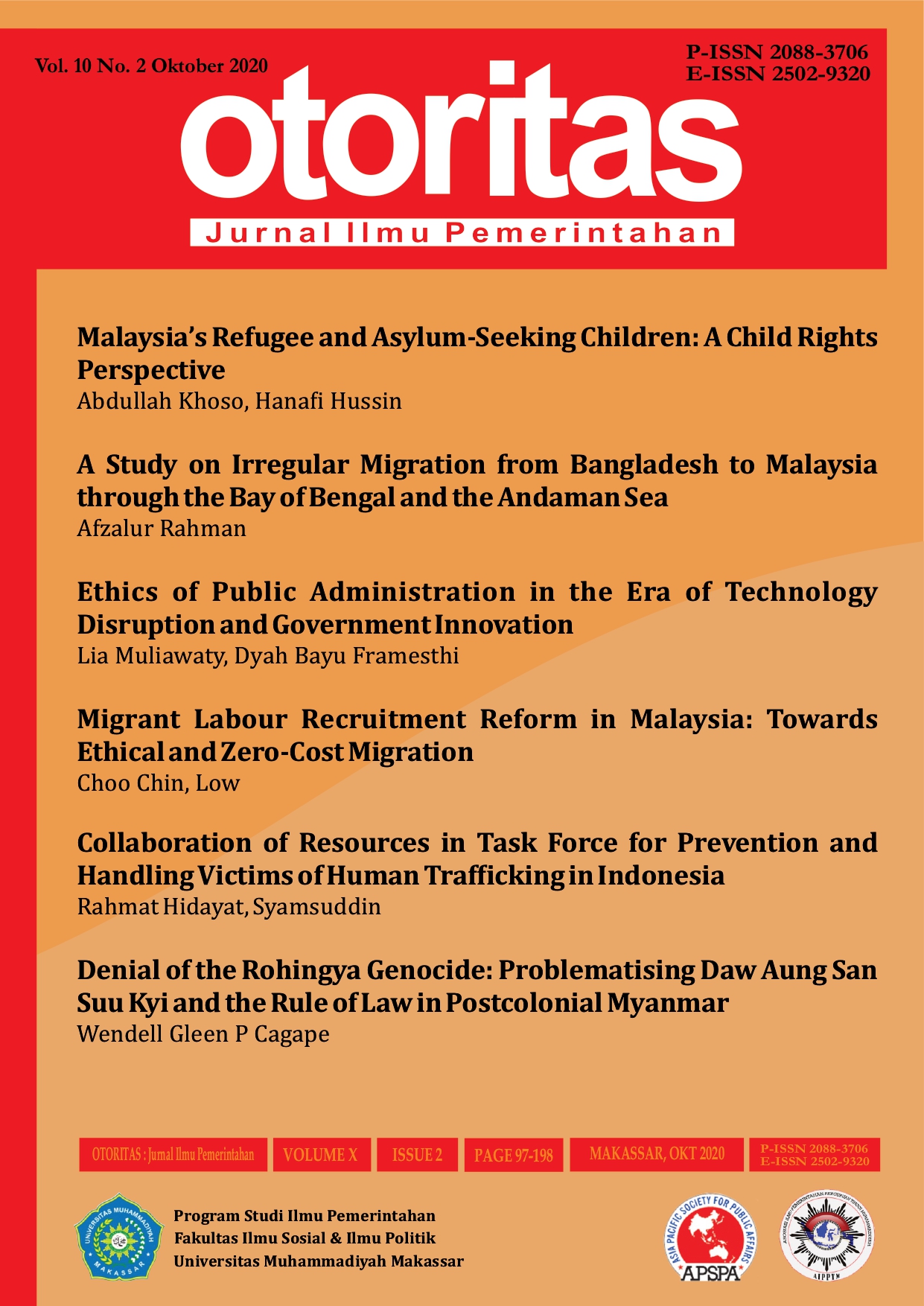Collaboration of Resources in Task Force for Prevention and Handling Victims of Human Trafficking in Indonesia
DOI:
https://doi.org/10.26618/ojip.v10i2.2824Keywords:
Collaboration, Taskforce, Prevention, Victim, Human TraffickingAbstract
The purpose of this study is to examine the cause of the ineffectiveness of resource collaboration in preventing and handling trafficking victims in West Java Province. This research method is a qualitative study that focuses on human and social problems through primary and secondary data collection. The results of this study indicate that the collaboration of resources in the prevention and handling of victims of trafficking in persons in West Java Province has not been effective. It triggered by the leading sector, problems of coordination of sharing resources, overlapping problems, roles, and resources, political factors, constraints of responsiveness of policymakers, and administrative issues.
References
Bintari, A., & Djustiana, N. (2015). Upaya penanganan korban dan pencegahan tindak perdagangan orang (human trafficking) di Kabupaten Indramayu Provinsi Jawa Barat. CosmoGov: Jurnal Ilmu Pemerintahan, 1(1), 124-148.
Borualogo, I. S. (2018). Resilience on human trafficking victims in West Java. MIMBAR: Jurnal Sosial dan Pembangunan, 34(1), 204-212.
Dwiyanto, A. (2015). Manajemen Pelayanan Publik: Peduli, Inklusif, dan Kolaboratif. Yogyakarta: Gajah Mada University Press.
Eviningrum, S., & Jamin, M. (2019, October). Developing Human Rights-Based Legal Protection Model on Victims of Child Trafficking in Indonesia. In 3rd International Conference on Globalization of Law and Local Wisdom (ICGLOW 2019). Atlantis Press.
Grindle, G. (1980). Politic and Policy Implementation in the Third Word. Princeton: Princeton University Press.
Hidayat, R., & Syamsuddin, S. (2019). Penetrasi konteks sosial budaya dalam membangun collaborative governance pada gugus tugas pencegahan dan penanganan korban perdagangan orang kekerasan terhadap perempuan dan anak di provinsi jawa barat. Jurnal Politikom Indonesiana, 4(1), 240-270.
Joshi, L., Wibawa, G., & Sinclair, F. L. (2001). Local ecological knowledge and socio-economic factors influencing farmers’ management decisions in jungle rubber agroforestry systems in Jambi, Indonesia. World Agroforestry Centre (ICRAF).
Kuncoro, A., Addison, V., & Isfandiarni, I. (2013). Varieties of governance of public goods delivery in Indonesia: the case of roads after decentralisation and local democratisation. University of Indonesia Working Paper in Economics and Business.
Nugroho, R. (2014). Metode Penelitian Kebijakan. Yogyakarta: Pustaka Pelajar.
Priansa, D. J. (2017) Manajemen Kinerja Kepegawaian. Dalam pengelolaan SDM Perusahaan. Bandung: CV. Pustaka Setia.
Powell, T., Christ, K. C., & Birkhead, G. S. (2008). Allocation of ventilators in a public health disaster. Disaster Medicine and Public Health Preparedness, 2(1), 20-26.
Santoso, A. (2012). Hukum, Moral, dan Keadilan: Sebuah Filsafat Hukum. Jakarta: Kencana.
Sapardjaja, K. E. (2003). Trafficking Perempuan dan Anak di Jawa Barat (Studi Kasus di Kabupaten Bandung, Indramayu dan Karawang). Sosiohumaniora, 5(2), 131.
Sarihati, T., Mukhlisiana, L., & Krisnayana, R. (2020). The Evaluation of Prevention and Handling Program Policy for Human Trafficking. International Journal of Psychosocial Rehabilitation, 24(2).
Subarsono, A. (2016). Kebijakan Publik dan Pemerintahan Kolaboratif, Isu-Isu Kontemporer. Yogyakarta: Penerbit Gava Media.
Downloads
Published
Issue
Section
License
The Editorial Team of Otoritas: Jurnal Ilmu Pemerintahan reserves the right to transfer the copyright of the article once it has been accepted and a decision has been made to publish it.
Department of Government Studies, Faculty of Social and Political Sciences, Universitas Muhammadiyah Makassar in collaboration with Muhammadiyah’s College Association of Government Studies (AIPPTM) and Asia Pacific Society for Public Affairs (APSPA) as the publisher of Otoritas: Jurnal Ilmu Pemerintahan holds the copyright of all articles published in this journal.
The Publisher holds the right to reproduce and distribute the article and author is not allowed to publish the same article published in this journal.
Statement of Authenticity and Manuscript Copyright can be downloaded: here
After filling in the statement letter, please send via e-mail: otoritas@unismuh.ac.id






